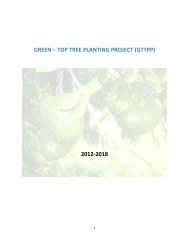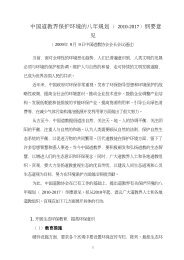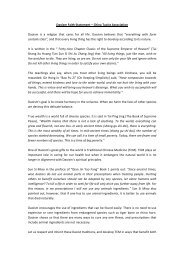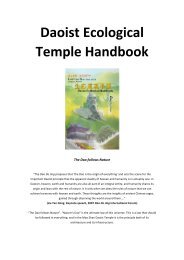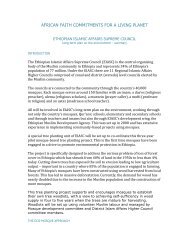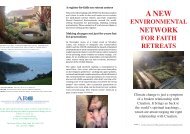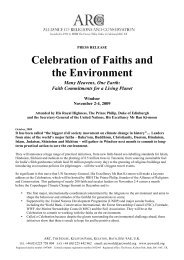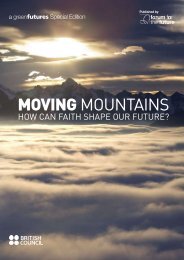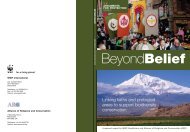summary paper - Alliance of Religions and Conservation
summary paper - Alliance of Religions and Conservation
summary paper - Alliance of Religions and Conservation
Create successful ePaper yourself
Turn your PDF publications into a flip-book with our unique Google optimized e-Paper software.
The battle between two opposing but very unequal forces is still raging. The voice <strong>of</strong> the Environmentalist<br />
has been relatively feeble but it is growing both in volume <strong>and</strong> influence among the educated peoples <strong>of</strong><br />
the world. But the richest countries <strong>of</strong> the world <strong>and</strong> their MultiNational Corporations (MNC’s) measure<br />
their success in terms <strong>of</strong> economic growth <strong>and</strong> not in terms <strong>of</strong> restoring harmony with Nature. Between<br />
the very rich <strong>and</strong> the aspiring rich are the very poor peoples <strong>of</strong> SubSaharan Africa who tend to see<br />
themselves in the image <strong>of</strong> the socalled ‘developed countries’. They are even suspicious sometimes<br />
about the <strong>Conservation</strong>ists who seem to prefer the preservation <strong>of</strong> fauna <strong>and</strong> flora at Man’s expense. But<br />
the picture today is much more complex than we knew only forty to fifty years ago. We have come to<br />
underst<strong>and</strong> more about environmental pollution as a global phenomenon <strong>and</strong> its relationship to the<br />
industrial processes <strong>and</strong> their wastes. We underst<strong>and</strong> the impact <strong>of</strong> the excessive use <strong>of</strong> chemical<br />
fertilizers, pesticides <strong>and</strong> herbicides on the very people we are trying to nourish quite apart from its effects<br />
on the original natural residents <strong>of</strong> the farm areas <strong>and</strong> hedgerows they were expelled from. We<br />
underst<strong>and</strong> about the ozone layer <strong>and</strong> its protective cover to all living creatures <strong>and</strong> have learnt to<br />
measure its deterioration. We know more about global warming <strong>and</strong> the impact <strong>of</strong> fossil fuels on this. Rich<br />
countries <strong>and</strong> their industrial lobbies regard those who point out the apocalyptic impact <strong>of</strong> such global<br />
warming label them Prophets <strong>of</strong> Doom <strong>and</strong> find false solace in the last frontier: science <strong>and</strong> technology<br />
will find a solution before disaster sets in. The Brundtl<strong>and</strong> ‘Sustainable Development’ is supposed to<br />
provide a compromise approach to dealing with poverty without swallowing hook, line <strong>and</strong> sinker the<br />
doctrine <strong>of</strong> development oblivious <strong>of</strong> the need to restore harmony with Nature in the pursuit <strong>of</strong> that<br />
development.<br />
What is the Islamic perspective in this hot pursuit <strong>of</strong> development Islam like other world religions have<br />
been systematically marginalized in the quest for development. While a huge network <strong>of</strong> mosques is<br />
inviting us to use them to educate, to mobilize <strong>and</strong> to unleash young men <strong>and</strong> women onto their<br />
respective societies. There are any number <strong>of</strong> verses in the Holy Quran <strong>and</strong> the Hadith <strong>of</strong> the Prophet<br />
(SAW) to support a deep respect for Nature <strong>and</strong> its conservation. To translate this into an Islamofriendly<br />
set <strong>of</strong> practices is quite another matter. This is a challenge to Islamic scholars as well as economic<br />
developers to chew hard at. We pray hard for their joint success.<br />
Kul C. Gautam<br />
Deputy Executive Director <strong>of</strong> UNICEF:<br />
‘Partnering with religions to protect the children <strong>and</strong> the environment as key to<br />
sustainable development’<br />
Excellencies, Venerable Religious Leaders, Distinguished Participants <strong>and</strong> Friends,<br />
It is an honour to be with you here in the Soria Moria Centre for Sustainability where the Norwegian<br />
Government’s most recent Declaration on International Policy was promulgated last year. What an<br />
inspiring Declaration it is – a testament to Norway’s enlightened commitment to human solidarity,<br />
multilateralism, <strong>and</strong> faith in the principles <strong>of</strong> the United Nations. If all countries <strong>of</strong> the world made similar<br />
commitments, <strong>and</strong> honoured them, the state <strong>of</strong> humanity would surely be much better. And we would be<br />
living in a world truly fit for our children.<br />
Two decades ago, an International Commission on Environment <strong>and</strong> Development led by a great leader<br />
<strong>of</strong> this country Gro Harlem Brundtl<strong>and</strong>, defined for us “sustainable development” as “development that<br />
meets the needs <strong>of</strong> the present without compromising the ability <strong>of</strong> future generations to meet their own<br />
needs.” Yet the development patterns we have followed so far have largely failed to achieve the l<strong>of</strong>ty<br />
goals outlined by the Brundtl<strong>and</strong> Commission in its memorable report on Our Common Future. The<br />
Millennium Declaration <strong>and</strong> the Millennium Development Goals are our latest attempts to lead us in that<br />
direction. And we owe it to our children <strong>and</strong> their children to ensure that these goals are achieved,<br />
sustained <strong>and</strong> surpassed.<br />
As the world’s leading advocate <strong>and</strong> activist for children, UNICEF’s work for the past 60 years has been<br />
<strong>and</strong> continues to be to ensure that children’s rights to survival, development, protection <strong>and</strong> participation<br />
are protected at all times. The three focus areas <strong>of</strong> this conference: Development, Religion <strong>and</strong><br />
31



